九年级英语上学期九年英语单元内容总结2
人教版九年级英语unit2知识点总结
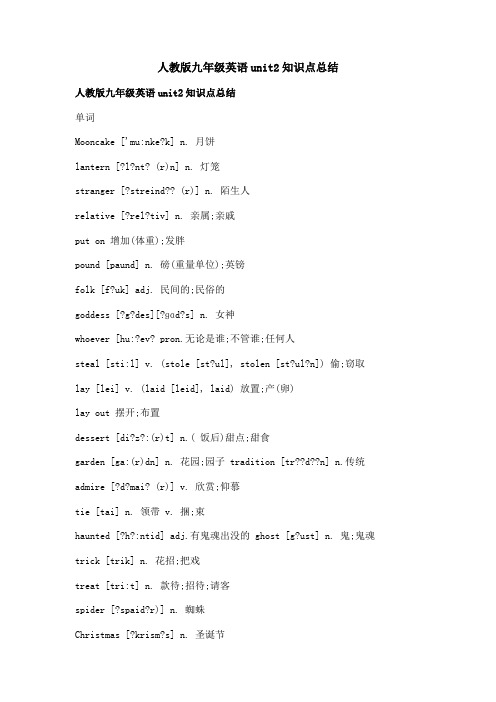
人教版九年级英语unit2知识点总结人教版九年级英语unit2知识点总结单词Mooncake ['mu:nke?k] n. 月饼lantern [?l?nt? (r)n] n. 灯笼stranger [?streind?? (r)] n. 陌生人relative [?rel?tiv] n. 亲属;亲戚put on 增加(体重);发胖pound [paund] n. 磅(重量单位);英镑folk [f?uk] adj. 民间的;民俗的goddess [?g?des][?ɡɑd?s] n. 女神whoever [hu:?ev? pron.无论是谁;不管谁;任何人steal [sti:l] v. (stole [st?ul], stolen [st?ul?n]) 偷;窃取lay [lei] v. (laid [leid], laid) 放置;产(卵)lay out 摆开;布置dessert [di?z?:(r)t] n.( 饭后)甜点;甜食garden [ga:(r)dn] n. 花园;园子 tradition [tr??d??n] n.传统admire [?d?mai? (r)] v. 欣赏;仰慕tie [tai] n. 领带 v. 捆;束haunted [?h?:ntid] adj.有鬼魂出没的 ghost [g?ust] n. 鬼;鬼魂trick [trik] n. 花招;把戏treat [tri:t] n. 款待;招待;请客spider [?spaid?r)] n. 蜘蛛Christmas [?krism?s] n. 圣诞节lie [laI] v. (lay [leI],lain [leIn]) 存在;平躺;处于novel [?n?vl] [?na:vl] n.(长篇)小说eve [i:v] n.(尤指宗教节假日的)前夕;前夜dead [ded] adj.死的;失去生命的business [?bizn?s] n. 生意;商业punish [?p?nis] v. 处罚;惩罚 warn [w?:(r)n] v. 警告;告诫end up 最终成为;最后处于present [preznt] n. 现在;礼物 adj. 现在的nobody [n?ub?di] [n?uba:di] pron. 没有人warmth [w?:(r)mθ] n. 温暖;暖和spread [spred] v. 传播;展开 n. 蔓延;传播Macao [m??kau] 澳门Chiang Mai [?t?i?n?maI], [d?a:nmaI] 清迈(泰城市)Water Festiwal 泼水节Mid-Autumn中秋节Mother's Day母亲节Father's Day 父亲节Halloween [?h?l?u?i:n] 万圣节前夕A Christmas Carol 《圣诞欢歌》(小说名)Easter 复活节Clara [?kla:r?] [?kler?] 克拉拉(女名)Santa [?s?nt?] Claus [kl?:z] 圣诞老人Charles [t?a:(r)lz] Dickens [?dik?nz] 查尔斯 ? 狄更斯(英)Scrooge [skru:d?] 斯克鲁奇 n.(非正式)吝啬鬼Jacob [?d?eik?b]Marley [?ma:(r)li] 雅各布 ? 马利知识梳理重点短语1.put on 增加(体重);发胖2.care about 关心; 在乎3.end up 最终成为,最后处于4.not only ……but also……不但……而且……5.shoot down 射下ed to do 过去常常做……7.remind sb. of 使某人想起8.give out 分发发放9.the water festival 泼水节10.the Chinese spring festival 中国春节11.next year 明年12.sound like 听起来像13.each other 互相彼此14.in the shape of 以……的形状15.on mid-autumn night 在中秋之夜16.fly up to 飞向y out 摆开布置e back 回来19.as a result 结果因此20.Mother’s day 母亲节21.more and more popular 越来越受欢迎22.think of 想起 ;认为 ;思考23.dress up 装扮穿上盛装24.the importance of ……的重要性25.make money 挣钱26.in need 需要帮助处于困境中27.between …and…在……和……之间28.the dragon boat festival 龙舟节29.the lantern festival 元宵节30.like best 最喜欢31.go to …for a vacation 去……度假32.be similar to 与……相似33.wash away 冲走洗掉34.Mid-autumn festival 中秋节35.shoot down 射下36.call out 大声呼喊37.the tradition of ……的传统38.at night 在夜里; 在晚上39.one…,the other…一个……,另一个…...40.Father’s day 父亲节重点句型1. I think that they’ re fun to watch.我认为它们看着很有意思。
九年级英语unit2知识点总结

九年级英语unit2知识点总结九年级英语Unit 2知识点总结Unit 2是九年级英语中的一单元,内容主要包括一些日常生活中的常用英语表达和语法知识。
在这个单元里,我们将学习如何描述人物、事物以及地点,并且掌握一些重要的语法规则,比如名词的用法、形容词和副词的比较级和最高级等。
一、描述人物在Unit 2中,我们学习了如何用英语来描述人物。
要描述一个人,我们可以用外貌特征、性格特点、兴趣爱好等方面的词汇来进行描绘。
例如:1. 外貌特征:He has short black hair and wears glasses.(他有短发,戴眼镜。
)She is tall and has blue eyes.(她个子高,眼睛是蓝色的。
)2. 性格特点:He is kind and helpful.(他很友善,乐于助人。
)She is shy but very smart.(她很害羞,但非常聪明。
)3. 兴趣爱好:He enjoys playing basketball in his free time.(他喜欢在空闲时间打篮球。
)She loves reading and writing stories.(她喜欢阅读和写故事。
)二、描述事物除了描述人物,我们还可以用英语来描述事物。
在Unit 2中,我们学习了如何用形容词来描述事物的特征、颜色和大小。
例如:1. 特征描述:The car is fast and comfortable.(这辆车开起来快速又舒适。
)The house is big and spacious.(这个房子很大、宽敞。
)2. 颜色描述:Her dress is blue and beautiful.(她的裙子是蓝色的,很漂亮。
)The flowers in the garden are red and vibrant.(花园里的花是红色的,很鲜艳。
)3. 大小描述:The laptop is small and lightweight.(这台笔记本电脑小巧轻便。
仁爱版九年级英语上册Unit2 知识点总结
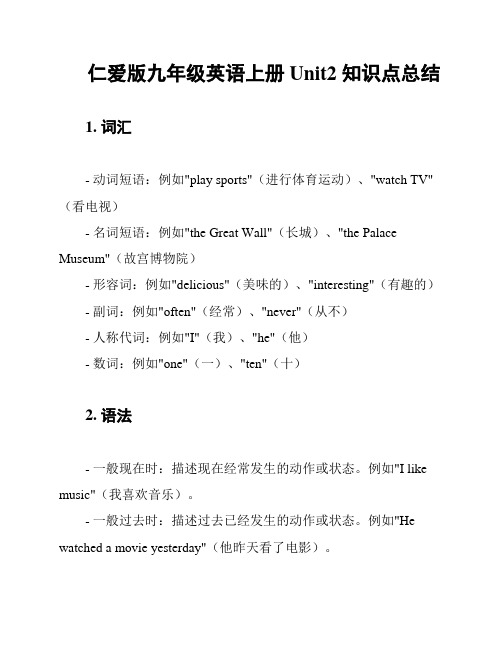
仁爱版九年级英语上册Unit2 知识点总结1. 词汇- 动词短语:例如"play sports"(进行体育运动)、"watch TV"(看电视)- 名词短语:例如"the Great Wall"(长城)、"the Palace Museum"(故宫博物院)- 形容词:例如"delicious"(美味的)、"interesting"(有趣的)- 副词:例如"often"(经常)、"never"(从不)- 人称代词:例如"I"(我)、"he"(他)- 数词:例如"one"(一)、"ten"(十)2. 语法- 一般现在时:描述现在经常发生的动作或状态。
例如"I like music"(我喜欢音乐)。
- 一般过去时:描述过去已经发生的动作或状态。
例如"He watched a movie yesterday"(他昨天看了电影)。
- 现在进行时:描述当前正在进行的动作。
例如"We are playing basketball"(我们正在打篮球)。
- 比较级与最高级:用于比较两个或多个事物的不同程度。
例如"He is taller than his brother"(他比他兄弟高)。
- 物主代词:表示所属关系。
例如"This is my book"(这是我的书)。
3. 句型- 陈述句:陈述一个事实或描述一个状态。
例如"I am a student"(我是一名学生)。
- 疑问句:用来提问。
例如"Do you like English?"(你喜欢英语吗?)。
九年级英语2单元知识点总结

九年级英语2单元知识点总结一、重点单词。
1. used to.- 用法:used to + 动词原形,表示过去常常做某事,暗指现在不做了。
例如:I used to play football every day after school, but now I'm too busy.(我过去放学后每天都踢足球,但现在我太忙了。
)- 否定形式:didn't use to或used not to。
例如:He didn't use to like reading. = He used not to like reading.(他过去不喜欢阅读。
)- 一般疑问句形式:e to...?或Used...to...? 例如:Did you use to be afraid of the dark? = Used you to be afraid of the dark?(你过去害怕黑暗吗?)2. dark.- 词性:形容词,意为“黑暗的;昏暗的”;名词,意为“黑暗;暗处”。
例如:It's too dark in this room.(这个房间太暗了。
);Cats can see clearlyin the dark.(猫在黑暗中能看得很清楚。
)3. spider.- 词性:名词,意为“蜘蛛”。
复数形式为spiders。
例如:There is a spider on the wall.(墙上有一只蜘蛛。
)4. insect.- 词性:名词,意为“昆虫”。
例如:Ants are very small insects.(蚂蚁是非常小的昆虫。
)5. terrify.- 词性:动词,意为“使害怕;使恐惧”。
常见搭配:terrify sb.例如:The loud noise terrified the baby.(巨大的噪音吓坏了婴儿。
)- 形容词形式:terrified(感到害怕的,用来形容人)和terrifying(令人害怕的,用来形容事物)。
九年级上册英语u2t3知识点总结

九年级上册英语u2t3知识点总结Unit 2, Topic 3 Knowledge Review: A Comprehensive SummaryIntroduction:In this article, we will delve into a comprehensive summary of the key concepts covered in Unit 2, Topic 3 of the 9th-grade English textbook. The aim is to revisit and consolidate our understanding of the important points discussed. Let's begin!Vocabulary Expansion:To effectively communicate in English, it is essential to possess a strong vocabulary base. Topic 3 introduced us to several new words, such as 'consult,' 'quaint,' 'awkward,' 'potential,' 'impose,' and'reminiscent.' Understanding the meanings and usage of these words enables us to express ourselves more fluently and precisely.Common Mistakes to Avoid:During the course of learning English, we often encounter certain mistakes that are worth noting. In Topic 3, we focused on two such errors: improper usage of prepositions and confusing verb tenses.Prepositions: A common mistake is the incorrect use of prepositions, such as 'on,' 'at,' and 'in.' For example, we say "I am at home" rather than "I am in home." Knowing when to use the correct preposition not only enhances the clarity of our sentences but also showcases our language proficiency.Verb Tenses: Another frequent error lies in the confusion of verb tenses, particularly the present simple and present continuous tenses. We use the present simple to describe general truths or routines, while the present continuous tense signifies an action happening at the moment of speaking or in the near future. Being mindful of these distinctions helps us convey our intended message accurately.Idioms and Expressions:Idioms and expressions are an integral part of any language. They add color and depth to our communication. Topic 3 introduced us to a few idioms and expressions such as 'take the plunge,' 'give it a shot,' and 'miss the point.' Understanding and incorporating these idioms into our speech can potentially make our English conversations more engaging and natural.Reading Comprehension:Reading comprehension is a crucial skill that aids in understanding written texts. In Topic 3, we practiced this skill through various reading exercises. It's important to adopt effective strategies such as scanning for keywords, understanding context, and making inferences while reading. These techniques not only improve our understanding but also enhance our reading speed.Writing Skills:Developing strong writing skills is essential for effective communication. In Topic 3, we learned about different elements that contribute to good writing, such as cohesive devices and appropriate paragraphing.Cohesive Devices: Cohesive devices like conjunctions, transition words, and linking phrases help connect ideas and make our writing flow smoothly. Examples of these include 'however,' 'therefore,''moreover,' and 'in contrast.' Utilizing these devices appropriately in our writing enhances coherence and organization.Paragraphing: Proper paragraphing is crucial in structuring our writing effectively. Each paragraph should focus on a specific topic or idea and begin with a clear topic sentence. Ensuring unity and coherence within each paragraph creates a cohesive piece of writing.Conclusion:As we conclude this knowledge review of Unit 2, Topic 3, it is paramount to revisit these key concepts from time to time to cement our understanding of the English language. By expanding our vocabulary, avoiding common mistakes, utilizing idioms and expressions, mastering reading comprehension, and developing strong writing skills, we will continue to enhance our proficiency in English. Keep practicing and exploring the language!。
译林英语九年级上册第二单元unit 2重要知识点总结
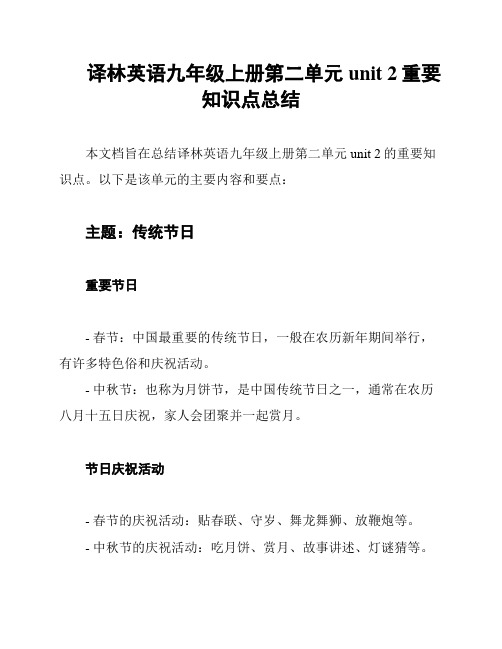
译林英语九年级上册第二单元unit 2重要知识点总结本文档旨在总结译林英语九年级上册第二单元unit 2的重要知识点。
以下是该单元的主要内容和要点:主题:传统节日重要节日- 春节:中国最重要的传统节日,一般在农历新年期间举行,有许多特色俗和庆祝活动。
- 中秋节:也称为月饼节,是中国传统节日之一,通常在农历八月十五日庆祝,家人会团聚并一起赏月。
节日庆祝活动- 春节的庆祝活动:贴春联、守岁、舞龙舞狮、放鞭炮等。
- 中秋节的庆祝活动:吃月饼、赏月、故事讲述、灯谜猜等。
词汇和短语- 重要词汇:节日、传统、庆祝、举行、特色、俗、贴春联、守岁、舞龙舞狮、放鞭炮、月饼、赏月、故事讲述、灯谜猜。
- 实用短语:Happy Spring Festival!(春节快乐!)、Enjoy the mooncakes!(品尝月饼吧!)、Guess the riddles!(猜猜灯谜吧!)等。
语法要点- 肯定句和否定句:用于陈述事实或否定事实的句子结构。
- 一般疑问句:用于询问事实的句子结构。
- 特殊疑问句:用于询问特定细节、原因、方式等的句子结构。
阅读理解技巧- 根据文章内容回答问题:仔细阅读文章,理解文章主旨和细节,根据题目的要求回答问题。
- 推理判断:在理解文章的基础上,运用逻辑推理能力做出正确的判断。
- 查找信息:通过阅读文章,找出相关信息以回答问题。
本文档总结了译林英语九年级上册第二单元unit 2的重要知识点,包括传统节日、节日庆祝活动、词汇和短语、语法要点以及阅读理解技巧。
通过掌握这些知识点,你将更好地理解和应用本单元的内容。
九年级上册英语第二单元知识点总结
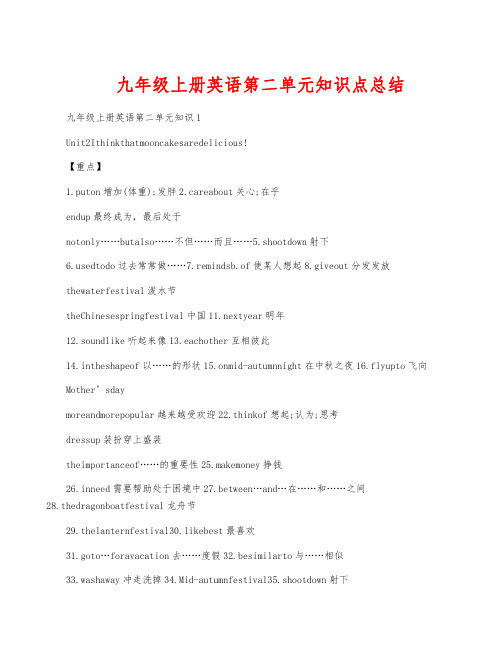
九年级上册英语第二单元知识点总结九年级上册英语第二单元知识1Unit2Ithinkthatmooncakesaredelicious!【重点】1.puton增加(体重);发胖2.careabout关心;在乎endup最终成为,最后处于notonly……butalso……不但……而且……5.shootdown射下edtodo过去常常做……7.remindsb.of使某人想起8.giveout分发发放thewaterfestival泼水节theChinesespringfestival中国11.nextyear明年12.soundlike听起来像13.eachother互相彼此14.intheshapeof以……的形状15.onmid-autumnnight在中秋之夜16.flyupto飞向Mother’sdaymoreandmorepopular越来越受欢迎22.thinkof想起;认为;思考dressup装扮穿上盛装theimportanceof……的重要性25.makemoney挣钱26.inneed需要帮助处于困境中27.between…and…在……和……之间28.thedragonboatfestival龙舟节29.thelanternfestival30.likebest最喜欢31.goto…foravacation去……度假32.besimilarto与……相似33.washaway冲走洗掉34.Mid-autumnfestival35.shootdown射下callout大声呼喊thetraditionof……的传统38.atnight在夜里;在晚上one…,theother…一个……,另一个…...Father’sday【重点句型】Ithinkthatthey’refuntowatch.我认为它们看着很有意思。
Whatdoyoulikeabout…?WhatdoyoulikebestabouttheDragonBoatFestival?关于,你最喜欢什么?Whatagreatday!多么美好的一天!4.1wonderif…Iwonderifit’ssimilartotheWaterFestivaloftheDaipeopleinYunnanProvince.我想知道它是否与云南傣族的泼水节相似。
九年级上册仁爱版英语u2t3知识点总结
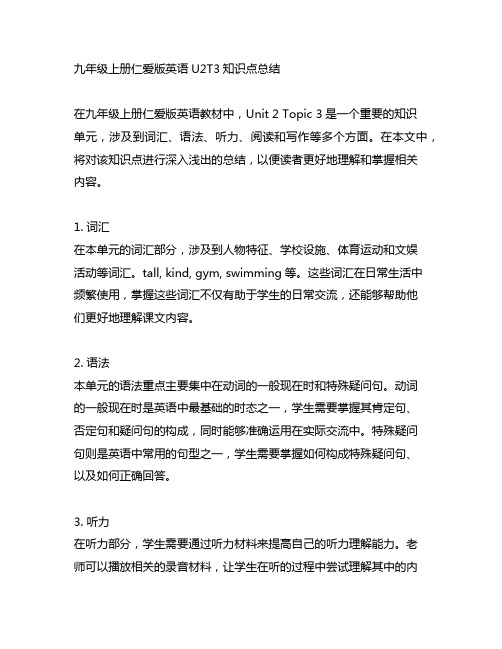
九年级上册仁爱版英语U2T3知识点总结在九年级上册仁爱版英语教材中,Unit 2 Topic 3是一个重要的知识单元,涉及到词汇、语法、听力、阅读和写作等多个方面。
在本文中,将对该知识点进行深入浅出的总结,以便读者更好地理解和掌握相关内容。
1. 词汇在本单元的词汇部分,涉及到人物特征、学校设施、体育运动和文娱活动等词汇。
tall, kind, gym, swimming等。
这些词汇在日常生活中频繁使用,掌握这些词汇不仅有助于学生的日常交流,还能够帮助他们更好地理解课文内容。
2. 语法本单元的语法重点主要集中在动词的一般现在时和特殊疑问句。
动词的一般现在时是英语中最基础的时态之一,学生需要掌握其肯定句、否定句和疑问句的构成,同时能够准确运用在实际交流中。
特殊疑问句则是英语中常用的句型之一,学生需要掌握如何构成特殊疑问句、以及如何正确回答。
3. 听力在听力部分,学生需要通过听力材料来提高自己的听力理解能力。
老师可以播放相关的录音材料,让学生在听的过程中尝试理解其中的内容,并进行相应的练习和巩固。
在这一环节,学生可以通过大量的听力训练来提高自己的英语听力水平,从而更好地应对日常生活和学习中的听力挑战。
4. 阅读阅读材料往往是帮助学生扩大阅读面和提升阅读能力的重要途径。
在本单元的阅读部分,学生将接触到关于不同学校设施和活动的相关内容,通过阅读这些材料,学生可以了解到英语国家的学校生活和文化,同时提升自己的阅读能力。
5. 写作在写作部分,学生需要根据具体情境来进行写作练习。
描述自己的学校或写一篇日记等。
通过这些写作练习,学生可以更好地理解课文内容,并提高自己的表达能力和写作水平。
总结回顾通过本单元的学习,学生不仅能够掌握相关词汇和语法知识,还能够提高自己的听力、阅读和写作能力。
学生也能够从课文中了解到不同国家的学校文化和生活方式,拓宽自己的视野。
本单元的学习对学生的英语能力提升和文化交流都具有重要意义。
个人观点和理解对于本单元的学习,我个人认为学生应该注重实践和运用。
九年级上册英语u2知识点归纳

九年级上册英语u2知识点归纳九年级上册英语Unit 2是一个涉及到许多不同主题和语法点的单元。
在这篇文章中,我们将对这个单元中的主要知识点进行一个全面的归纳和总结。
首先,让我们从这个单元的主题“School Education”开始。
在这个主题下,我们学习了一些与学校教育有关的基本词汇和短语。
比如,“compulsory education”(义务教育)、“primary school”(小学)、“secondary school”(中学)等。
我们还学习了如何用英语表达我们的学校科目、课程表和时间表。
在这个主题下,我们还讨论了一些与学校生活和学校环境有关的内容。
我们学习了如何用英语表达“classroom”(教室)、“library”(图书馆)、“canteen”(食堂)等。
我们还学习了许多动词和形容词,如“study”(学习)、“attend”(参加)、“noisy”(嘈杂的)、“clean”(干净的)等,这些词汇和短语可以帮助我们描述学校生活的各个方面。
接下来,我们来看看这个单元的语法重点。
在Unit 2中,我们学习了一些表示习惯、爱好和能力的动词短语,比如“enjoy”(喜欢)、“like”(喜欢)、“love”(热爱)、“can”(能够)等。
我们还学习了一些表示过去经历的动词短语,如“have been to”(去过)、“have visited”(参观过)等。
这些语法知识可以帮助我们用英语描述自己的兴趣爱好、过去的经历和能力。
此外,Unit 2还涉及到了一些提高阅读理解能力的技巧和策略。
在这个单元中,我们学习了如何通过上下文推测词义、如何根据关键词快速定位信息等。
这些技巧在提高我们的阅读能力和理解能力方面非常重要。
最后,在这个单元中,我们还学习了一些关于名人和名言的知识。
通过学习名人的经历和名言,我们可以拓宽自己的眼界,提高自己的人文素养。
在课堂上,我们可以组织讨论、写作等活动,加深对这些名人和名言的理解。
人教版九年级英语上册课件:Unit 2单元知识归纳(共13张PPT)
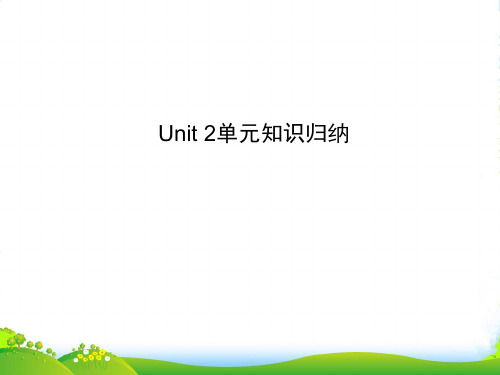
• Ⅱ.重点短语 • 1.The Water Festival in Thailand泰国
的泼水节
• 2.a little too crowded有点儿太拥挤 • 3.not that interesting并没有那么有趣 • 4.have/eat zongzi吃粽子 • 5.watch the races看比赛 • 6.be fun to do sth.做某事很有趣 • 7.eat out 出去吃饭 • 8.on one’s vacation在假期
• 9.eat five meals a day一天吃五顿饭 • 10.put on five pounds增重五磅 • 11.in two weeks两周后 • 12.the hottest month of the year • 一年中最热的一个月 • 13.be similar to与……相似 • 14.the Dai people in Yunnan Province
• 25.refuse to do sth.拒绝做某事 • 26.call out大声叫喊 • 27.lay out摆出;铺开;安排;布置;
设计
• 28.share sth.with sb.与某人分 享……
• 29.on the earth 在地球上 • 30.at night在晚上 • 31.as a result因此 • 32.take sb.out for lunch带某人出去吃
• 他多么想嫦娥能够回来啊!
• 6.But behind all these things lies the true meaning of Christmas.
• 但是在所有这些东西的背后有圣诞节的 真谛。
• 7.He now treats everyone with kindness and warmth,spreading love and joy everywhere he goes.
九年级英语上册第二单元重要知识点总结

九年级英语上册第二单元重要知识点总结九年级英语上册第二单元重要知识点总结Unit 2一、知识点1. used to 过去常常做某事,暗指现在已经不存在的动作或状态. 后跟动词原形. used to do sth.There used to be ….(反意疑问句)didn’t there?否定形式为: didn’t use to 或usedn’t to疑问形式为: Did…use to…? 或Used…to…?be/get used to doing sth.习惯于, to 为介词.2. wear 表示状态. =be in +颜色的词put on 表示动作.dress + 人给某人穿衣服.dress sb. / oneselfhave on表示状态(不用于进行时态)3. on the swim team on 是…的成员,在…供职.4. Don’t you remember me? 否定疑问句.(考点)Yes, I do. 不, 我记得. No, I don’t 是的, 我不记得了.5. 反意疑问句:① 陈述部分的主语为 this, that, 疑问部分主语用it; 陈述部分主语用 these, those, 疑问部分用they 做主语.例: This is a new story, isn’t it?Those are your parents, aren’t they?② 陈述部分是 there be 结构, 疑问部分仍用 there例: There was a man named Paul, wasn’t there?③ I am 后的疑问句, 用aren’t I例: I am in Class 2, aren’t I?④ 陈述部分与含有 not, no, never, few, little, hardly, seldom, neither, none 等词时,疑问部分用肯定.例: Few people liked this movie, didn’t they?但陈述句中若带有否定前缀或后缀的单词时, 这个句子仍视为肯定, 后面仍用否定.例: Your sister is unhappy, isn’t she?⑤ 陈述部分的主语若为不定式或 V-ing 短语, 疑问部分主语用it.例: To spend so much money on clothes is unnecessary, isn’t it?⑥ 陈述句中主语是 nobody, no one, everyone, everybody 等指人的不定代词时,疑问部分用they做主语; 若陈述部分主语是something, anything, noting, everything 等指事物的不定代词时, 疑问部分用it 做主语.例: Nobody says one word about the accident, do they?Everything seems perfect, doesn’t it?⑦ 当主语是第一人称I时, 若谓动为think, believe, guess 等词时, 且其后跟宾丛,这时疑问句部分的人称, 时态要与宾语从句保持一致, 同时还要考虑否定转移.例: I don’t think he can finish th e work in time, can he?⑧ 前面是祈使句, 后用will you? (let’s 开头时, 后用shall we?)6. be terrified of 害怕的程度比 be afraid of 深.7. miss: ① 思念, 想念例: I really miss the old days.② 错过, 未中, 未赶上, 未找到.例: It’s a pity that you miss the bus.The boy shot at the goal, but missed.8. no more (用在句中)=not…any more (用在句尾) 指次数;no longer (用在句中)=not…any longer (用在句尾) 指时间.9. right: ① adj. 正确的, 右边的② n. 右方, 权利③ adv. 直接地.10. It seems that Yu Mei has changed a lot. = Yu Mei seems to have changed a lot.11. afford + n. /pron. afford + to do 常与can, be able to 连用.例: Can you afford a new car?The film couldn’t afford to pay such large salaries.12. as well as 连词, 不但…而且… 强调前者. (若引导主语, 谓动与前者在人称和数上一致例: Living things need air and light as well as water.生命不仅需要水, 还需要空气和阳光.I as well as they am ready to help you.不仅是他们, 我也愿意帮助你.13. alone = by oneself 独自一人. lonely 孤独的, 寂寞的.14. in the last/past + 一段时间during the last/past + 一段时间与现在完成时连用.15. die (v.) dead (adj.) death (n.) dying (垂死的)16. play the piano 弹钢琴17. ①be/ become interested in sth. 对…感兴趣②be interested in doing sth. 对做…感兴趣③show great interest in 在……方面产生极大的兴趣④a place of interest 一处名胜 some places of interest如:He is interested in math, but he isn’t interested in speakingEnglish. 他对数学感兴趣,但是他对说英语不感兴趣。
九年级英语第二单元2b知识点总结

九年级英语第二单元2b知识点总结第一部分:词汇学习在英语学习中,词汇的掌握是非常重要的。
学好词汇,可以帮助我们更好地理解和运用英语。
本单元中,我们学习了一些重要的词汇和短语,包括:1. century (n.) –世纪2. festival (n.) –节日3. custom (n.) –习俗4. decorate (v.) –装饰5. ancestor (n.) –祖先6. traditional (adj.) –传统的7. symbol (n.) –象征8. feast (n.) –盛宴9. gather (v.) –聚集10. celebrate (v.) –庆祝通过学习这些词汇,我们可以更好地了解不同文化的习俗和传统。
第二部分:语法知识语法是我们构建句子和表达意思的重要工具。
在本单元中,我们学习了以下几个语法知识点:1. 一般现在时:表示经常发生的动作或客观事实,如:I often play basketball after school.2. 疑问句的构成:将助动词或be动词提至句首,如:Do you like music? Are you a student?3. 物主代词的用法:用来代替名词,表示所属关系,如:This is my book. That pen is hers.掌握这些语法知识,可以帮助我们正确地运用英语,更准确地表达自己的意思。
第三部分:阅读技巧英语阅读是提高语言能力和理解能力的重要途径。
在本单元中,我们学习了如何通过阅读理解文章,并回答相关问题。
以下是一些阅读技巧的作用:1. 首先,快速浏览整篇文章,了解大意和结构。
2. 其次,注意文章中的关键词和关键句,通过它们理解文章的具体信息。
3. 然后,注意文章的语法结构和上下文环境,进一步理解文章的隐含意思。
4. 最后,仔细阅读问题,根据文章中的提示找到答案。
这些阅读技巧可以帮助我们更好地理解英语文章,提高阅读理解能力。
人教版九年级全一册英语Unit2单元语法知识点总结
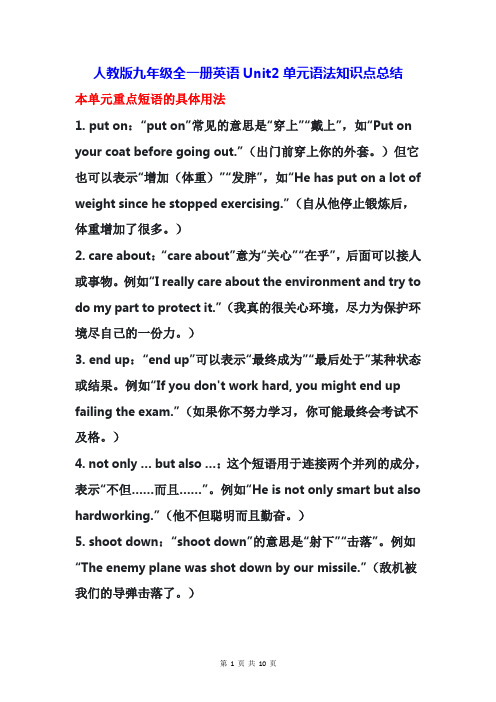
人教版九年级全一册英语Unit2单元语法知识点总结本单元重点短语的具体用法1. put on:“put on”常见的意思是“穿上”“戴上”,如“Put on your coat before going out.”(出门前穿上你的外套。
)但它也可以表示“增加(体重)”“发胖”,如“He has put on a lot of weight since he stopped exercising.”(自从他停止锻炼后,体重增加了很多。
)2. care about:“care about”意为“关心”“在乎”,后面可以接人或事物。
例如“I really care about the environment and try to do my part to protect it.”(我真的很关心环境,尽力为保护环境尽自己的一份力。
)3. end up:“end up”可以表示“最终成为”“最后处于”某种状态或结果。
例如“If you don't work hard, you might end up failing the exam.”(如果你不努力学习,你可能最终会考试不及格。
)4. not only … but also …:这个短语用于连接两个并列的成分,表示“不但……而且……”。
例如“He is not only smart but also hardworking.”(他不但聪明而且勤奋。
)5. shoot down:“shoot down”的意思是“射下”“击落”。
例如“The enemy plane was shot down by our missile.”(敌机被我们的导弹击落了。
)6. used to do:“used to do”表示过去常常做某事,但现在不再这样做了。
例如“I used to play basketball every day, but now I don't have time for it.”(我过去常常每天打篮球,但现在没有时间了。
九年级英语1-2单元短语详细总结

九年级英语1-2单元短语详细总结一、Unit 1短语总结1. 谈论日常生活(1) be/get used to doing sth 习惯于做某事(2) be interested in 对……感兴趣(3) be afraid/scared of 害怕/担心(4) go to the movies 去看电影(5) chat with 与……聊天(6) do one’s homework 做作业(7) go shopping 购物(8) play sports 参加体育运动(9) every day/week/month/year 每一天/每一周/每个月/每年2. 谈论学校生活(1) join 加入(2) form a club 组建俱乐部(3) have a class meeting 召开班会(4) play football/soccer 踢足球(5) be strict with 对……要求严格(6) be proud of 为……自豪(7) at the beginning of 在……开始的时候(8) have a great time 玩得开心3. 谈论兴趣爱好(1) be good at 擅长于……(2) have time for 业余时间(3) join 加入某俱乐部或组织(4) take photos 照相(5) go hiking 进行徒步旅行/去远足(6) go for a walk 去散步(7) the same as 与……相同(8) different from 与……不同二、Unit 2短语总结1. 关于情感表达的短语(1) get along with 与……相处(2) trust each other 相互信任(3) be angry with 生某人的气(4) apologize to sb 向某人道歉(5) feel like doing sth 想做某事(6) take it easy 别紧张/着急/担心(7) in surprise 吃惊地(8) as well 也/还要(9) so far 迄今为止(10) all over again 从头到尾再做一遍2. 关于表达观点的短语(1) have different opinions on 对……有不同的看法(2) argue with sb 和某人争吵(3) share one’s opinion and views 对某人的观点表示赞同和支持(4) express one’s ideas and views 表达某人的观点和看法3. 关于建议的短语(1) suggest doing 建议做某事(2) give sb some advice 给某人提一些建议以上就是九年级英语1-2单元所有的短语总结,希望能对你有所帮助。
- 1、下载文档前请自行甄别文档内容的完整性,平台不提供额外的编辑、内容补充、找答案等附加服务。
- 2、"仅部分预览"的文档,不可在线预览部分如存在完整性等问题,可反馈申请退款(可完整预览的文档不适用该条件!)。
- 3、如文档侵犯您的权益,请联系客服反馈,我们会尽快为您处理(人工客服工作时间:9:00-18:30)。
Unit 14 Have you packed yet?学习目标:1.综合复习各种基本时态,包括现在完成时态、一般现在时、一般过去时、一般将来时等;按类别复习词汇。
2.谈论近来发生的事件及对未来的计划。
3.增强学生做事的条理性及计划性。
一、词汇(一)基础词汇bathing 游泳,洗澡suit衣服,服装towel毛巾,手巾water浇灌,浇水guidebook 旅游手册,指南refrigerator 冰箱garage 汽车库,汽车间suitcase 小提箱,衣箱chop 砍,劈wood木头,木材light点燃,点着village乡村,村庄well 井,水井farm农场,农庄member 成员,会员,一份子scene (戏剧、歌剧等)的发生地点,背景last最近的,最后的major 较大的,较大的范围的hit成功而轰动一时的事物(如歌曲等) appear出现,露面,(公开)演出miss错过,遗漏lead 领导,主角mostly主要的,大部分air(音乐)曲调,旋律,乐曲poem诗,韵文(二)重点短语1. some day来日,有一天2. be off离开,走开3. bathing suit游泳衣4. water the plants浇花儿5. lock the windows锁窗子6. pack the camera把照相机装包里7. put in放进,进入8. turn off关闭9. clean out something清除某物内部使之整洁10. clean up something整洁,清理某物11. take the dog for a walk遛狗12. chop wood砍柴13. love doing something喜爱做某事14. light the fire for breakfast点火做早饭15. collect water 挑水16. write original songs写原创歌曲17. make a music video制作音乐录影带18. a hit CD一张流行的CD19. go on a world tour进行世界巡20. in search of寻找,寻求21. hope to do something 希望做某事22. so far迄今为止23. be sure (not) to do一定(不)要做某事24. spend time (in) doing花费时间做…25. think of 想到,考虑26. turning point转折点27. in one‟s life在某人的一生28. be off to离开去(某地)29. air show音乐表演二、日常用语1.Have you watered the plants? No,I haven’t.你已经浇花了吗?不,我没有。
Have you packed the camera yet? Yes. I‟ve already put it in my suitcase.你装好照相机了吗?是的,我已经把它放入旅行箱了。
Have you fed the cat? No. I haven‟t fed her yet.你喂猫了吗?不,还没有。
2. Have you bought a newspaper? Yes,I’ve already bought a newspaper.你买报纸了吗?是的,我已经买了。
3. Have you ever been to a concert?你曾看过音乐会吗?Yes,I have. I went to the National Day concert last year是的,我看了去年国庆节的音乐会。
Did you enjoy it? 你喜欢它吗?Yes,they had a great air show.是的,他们展现出的旋律很美。
三、知识讲解Section A:现在完成时★现在完成时是由“助动词have(has)+动词过去分词”构成。
★(1)表示过去发生或已经完成的某一动作对现在造成的影响或结果,常与already,just,yet,ever,never等连用。
例如:----Have you finished your work yet?----Yes,I have.I have just finished it.★注意:在这里要注意already和yet的辨析:★①already通常用于肯定句。
I have already told him.我已经告诉他了.I have already put it in my suitcase.我已经把它放进我的手提箱了.★②yet常用于疑问句和否定句。
----Have you watered the tree yet?你浇树了吗?----Yes,I have already watered it.我浇了.----Have you fed the dog?你喂过狗了吗?----No. I haven‟t fed it yet.没有,我没喂.★(2)表示过去已经开始,持续到现在的动作或状态,可以和表示从过去某一时刻延续到现在(包括“现在”在内)的一段时间的状语连用,如for,since,now,today,this month,this year等。
例如:I have lived here since 1980.从1980年以来我一直住这儿。
I have been at this school for over four years.我已经在这所学校呆了四年多。
★for和表示一段时间的词组连用,例如:for two minutes,for five hours,for ten days,for three weeks,for fourteen months,for twenty years.★since和表示过去某一时刻的词或词组连用,例如:since eight o'clock this morning,since last Sunday,since five weeks ago,since October等。
Section B:1. Have you packed yet?你打包了吗?★(1)这是一个现在完成时的句型,它是在两个时间上,一是过去,一是现在。
它的动作发生在过去,但对现在有影响或结果,而这种影响和结果是说话人的兴趣所在,所以常常后面不用时间状语。
Have/has+动词的过去分词,是它的基本结构。
例如:Someone has broken the door.有人把门打破了。
(结果,门仍破着)She has been ill.她刚生病了。
(结果,现在脸色还不好)★(2)pack包装,把……装箱★pack sth(up)into…整理行装例如:Pack clothes into a truck.把衣服装进衣箱内。
★pack into塞进,挤进例如:The children packed into the cinemas on a wet day.在雨天,孩子们挤进电影院。
2.Have you watered the plants yet?你浇花了吗?★water这里是动词,“浇水,洒水”的意思water the lawn/the plants/the streets洒水在草地(花木,街道)上★water the horses饮马3.I have not cleaned out the refrigerator yet. 我还没把冰箱清除干净。
★clean sth out 打扫某物之内部,扫除某物的尘土等。
例如:It is time for you to clean your bedroom. 现在该你打扫你的卧室的时候了。
★clean sth up清除罪犯和不道德分子,整顿(某物)。
例如:The mayor has decided to clean up the city.市长已决定要整顿市政。
★clean sth down清扫,擦干净例如:clean down the walls.把墙上的尘土扫下。
4.I will do it in a minute.我马上就做。
★in a minute=soon立刻例如:I will come downstairs in a minute.我马上下楼。
★to the minute=exactly一分不差,准确地例如:The train arrived at 7 o…clock to the minute.那班列车在7点到站。
★The minute that,as soon as 一…就…例如:I will call you as soon as I arrive in Beijing.我一到北京就给打电话。
5.Have you fed your cat yet?你喂猫了吗?★fed是feed(喂)的过去分词例如:What do you feed your dog on?你用什么喂你的狗?★be fed up with因多而厌烦,不满例如:I am fed up with your grumbling?我听够了你的怨言。
6.Are you ready,Tina?你准备好了吗?★ready for sth/to do sth准备就绪的★ready for work为工作准备就绪的★get ready for a journey作好旅行的准备★be ready to start准备出发7.I have so many chores to do today.今天我有太多的杂务要做。
chore.杂事(务)chores to do,其中to do 不定式作定语例如:I have nothing to say on this question. 在这个问题上,我没有什么话可说。
It was a game to remember. 那是令人难忘的球赛。
8.Then I have to take the dog for a walk.我还必须带着狗出去溜溜。
★(1)take携带,拿走某物,伴随某人例如:take letters to the post把信付邮take a friend home in one‟s car用汽车送朋友回家take the dog out for a walk 带狗出去散步★(2)take得到,享有,吃喝★(3)take a holiday/a walk /a bath/a deep breath休假(散步,沐浴,作深呼吸)9.I have not done any of these things yet because my grandfather came to chat to me.那些事情我一样也还没做,因为我祖父来和我聊天。
